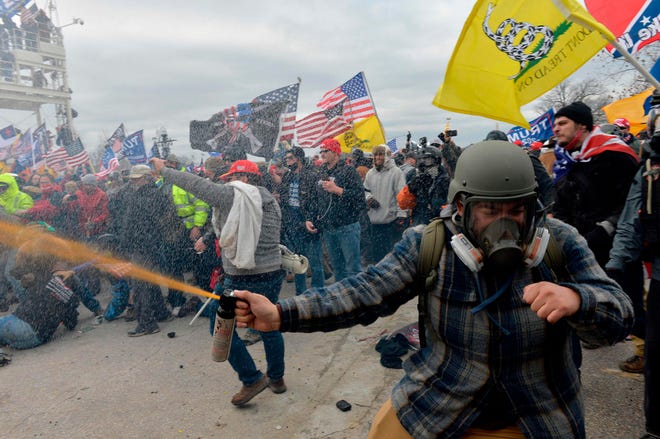Capitol Police officers sue Trump, extremists, alleging conspiracy, terrorism on Jan. 6
Seven officers from the United States Capitol Police are suing former President Donald Trump, his longtime adviser Roger Stone and members of far-right extremist groups, alleging they conspired to use violence Jan. 6 to attempt to prevent Congress from certifying the results of the 2020 presidential election.
The lawsuit, filed in the U.S. District Court for the District of Columbia on Thursday morning, alleges that Trump and the other defendants conspired with one other through the use of force, threats and intimidation that culminated in the attack on the Capitol.
Officer Jason DeRoche, an 18-year veteran of the Capitol Police and a Navy veteran, said the civil lawsuit isn’t about winning a financial settlement. Rather, he said, the lawsuit aims to set the record straight about what happened Jan. 6 and make sure history doesn’t repeat itself.
“We don’t want something like this happening ever again,” DeRoche said.
He said he wants Trump and the other defendants to be held accountable for what they did, so that “if they were to do this ever again, there would be consequences.”
Jan. 6 hearing:At hearing, officers recall brutal riot, ‘desperate struggle’ to hold back mob

Joining DeRoche in the lawsuit are six other veteran Capitol Police officers who have each served 13 to 35 years at the department. The complaint details the events of Jan. 6, describing the officers being assaulted, bear-sprayed and tear-gassed and believing their lives were threatened.
Officers stationed outside the Capitol were attacked for hours
DeRoche started his shift at 7 a.m. that day. A few hours later, he helped barricade the Capitol with bike racks against attacking Trump supporters, the lawsuit says. Over the course of a shift that lasted until 11:30 p.m., he was assaulted and attacked with bear spray, pepper spray and fire extinguishers. His eye was swollen shut, his arm was injured, and he suffered emotional injuries, the lawsuit says.
“These officers risked their lives and were brutally attacked defending the right of every citizen to a government of their choosing,” said Edward Caspar, senior counsel with the Lawyers’ Committee for Civil Rights Under Law, an advocacy group representing the police officers. “If they didn’t do what they did that day – if they didn’t have the courage to stand up – I don’t know that we’d be living in a democracy today.”
The lawsuit claims the defendants violated the federal Ku Klux Klan Act, a Reconstruction-era statute that allows individuals to sue when they are injured by conspiracies that “prevent, by force, intimidation, or threat, any person from accepting or holding any office, trust, or place of confidence under the United States.”
The law couldn’t fit the circumstances of the case better, Caspar said.
“This attack was about using force, intimidation and threats to prevent Congress from doing its job in certifying the election results and injuring the Capitol Police officers in the performance of their jobs,” he said.
Attorneys for Trump, Stone and several other defendants declined to comment or couldn’t be reached. Proud Boys chairman Enrique Tarrio, another defendant in the lawsuit, responded but didn’t comment on the allegations.
Jan. 6 suicides:Two additional DC officers who responded to US Capitol insurrection die by suicide
Suit argues events before the attack were part of a conspiracy
The lawsuit argues that the conspiracy grew throughout 2020 as Trump and far-right influencers, including the Oath Keepers and the Proud Boys, sowed doubts about the integrity of the presidential election.
It ties together events from around the country – the takeover of the Michigan state Capitol on April 30, 2020, by armed protesters, violent attacks by the Proud Boys and fiery television appearances by Stewart Rhodes, the leader of the Oath Keepers – to argue that they were all part of a nationwide conspiracy aimed at keeping Trump in office even after he lost the election.
The conspiracy increased in its fervor after the election, the lawsuit claims, as purveyors of the “Stop The Steal” conspiracy theory worked to spread disinformation about election fraud. Attacks and threats against election workers should be implicitly tied to the propaganda spread by Trump and others, the complaint argues.

Erwin Chemerinsky, dean of the University of California, Berkeley School of Law, said the lawsuit is “very clever.”
“They do a great job of describing what occurred on Jan. 6,” he said.
He said the plaintiffs may have trouble proving certain elements.
Given that the lawsuit is a civil rights case, it’s hard to understand exactly whose civil rights were infringed, Chemerinsky said.
“Is it the civil rights of the voters?” he said. “If a bunch of people get together and try to obstruct an abortion clinic, then that’s a clear conspiracy to interfere with human rights, but here, the question is: Whose civil rights are being infringed?”
Secondly, Chemerinsky said it may be hard to prove that the actions of the far-right groups were driven by racism, as the complaint suggests. Though there’s little doubt that the groups have racist ideologies, he said, it’s harder to prove racism was behind their attempts to interfere with the election.
“Was this intentionally about race? Or was it that these were racist people acting to keep the person they wanted in office remain in power?” Chemerinsky asked.
Chemerinsky said the central premise of the lawsuit is strong: that the defendants conspired to stop Congress and the Capitol Police from doing their job via threats and intimidation.
Criminal conspiracy cases underway
Many of the people named in the lawsuit face criminal charges for their alleged roles in the Capitol attack. Federal prosecutors brought three criminal conspiracy cases against groups of Proud Boys, Oath Keepers and Three Percenters.
Unlike the criminal cases, in which prosecutors must prove their case beyond a reasonable doubt, the plaintiffs in the civil case have a lower bar: a “preponderance of evidence” or a greater than 50% chance. Chemerinsky said it’s generally easier to prove a civil conspiracy claim than a criminal one.
Attorneys for the seven Capitol Police officers have the advantage that the criminal cases are proceeding alongside their lawsuit and producing evidence that can be used against the defendants in the civil case.
DeRoche said he hopes the lawsuit reveals the true danger the defendants pose to the American public. He described being absolutely shocked Jan. 6 by the violence and vitriol against him and his fellow officers.
“It’s a threat, period. It’s a domestic terrorist threat that the general public needs to be aware of,” he said. “I don’t want this to happen again anywhere else in the country.”
Contributing: Dinah Voyles Pulver



